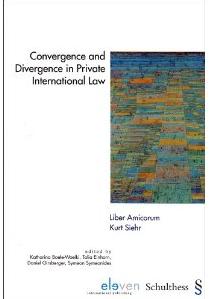The United Kingdom Supreme Court delivered its judgment in Dallah on November 3rd, 2010.
Readers will recall that the case was concerned with an arbitral award made by an ICC tribunal in Paris. Dallah was seeking enforcement in England. The Supreme court confirmed that the award would not be declared enforceable for lack of jurisdiction of the tribunal over the defendant, the Government of Pakistan (for more details see our previous post here). The case raised a variety of issues of English international commercial arbitration law that I will leave to my learned English coeditors. But it also raised a most interesting issue of conflict of laws involving French private international law.
The issue was which law governed the validity/existence of an arbitration agreement. English law and the New York Convention provide that, in the absence of a choice by the parties, the validity of an arbitral agreement is governed by “…the law of the country where the award was made.” In this case, that was French law. And the Supreme Court applied French law.
The problem with this view is that, if one were to ask a French court whether it would apply French law in such case, it would most certainly say no. Since the Dalico case in 1993, the French Supreme Court for private and criminal matters (Cour de cassation) has ruled that international arbitration agreements are not governed by any national law. This might look like a remarquable statement. It has shocked many French lawyers. It seems to have equally shocked quite a few Law Lords (more on this later). But however shocking it might be, it is a clear statement. According to the French Cour de cassation, French law does not govern the validity of arbitration agreements when the seat of the arbitration is in France. And one would think that the Cour de cassation knows what it is talking about when it comes to French law.
Which law governs then? Well, the two French law experts in this case had offered a reasonable interpretation. Their Joint Memorandum stated:
“Under French law, the existence, validity and effectiveness of an arbitration agreement in an international arbitration need not be assessed on the basis of national law, be it the law applicable to the main contract or any other law and can be determined according to rules of transnational law. To this extent, it is open to an international arbitral tribunal the seat of which is in Paris to find that the arbitration agreement is governed by transnational law”.
After citing Dalico, Lord Mance also started to explain:
15. This language suggests that arbitration agreements derive their existence, validity and effect from supra-national law, without it being necessary to refer to any national law.
Indeed.
Renvoi or not renvoi?
There was therefore an interesting issue before the English Supreme court. Its choice of law rule designated French law, but the French choice of law rule did not designate French susbtantive law. The question of renvoi had thus to be asked: would the English court ignore that French law did not want to be applied, or would it take it into consideration?
One possible answer could have been that, in the English conflict of laws, the scope of renvoi is limited to family law, and that, in all other fields, English courts do not care about foreign choice of law rules. Alternatively, the English Court could have answered that the New York Convention excludes renvoi. Lord Collins did suggest so. He cited one author to this effect. It is disappointing that he did not mention all the others, in particular the numerous Swiss scholars who have argued to the contrary.
But this is not the main answer that Lord Collins gave. The distinguished jugde ruled that there could be no renvoi, because the applicable French choice of law rule designated French law. He held:
124 … it does not follow that for an English court to test the jurisdiction of a Paris tribunal in an international commercial arbitration by reference to the transnational rule which a French court would apply is a case of renvoi. Renvoi is concerned with what happens when the English court refers an issue to a foreign system of law (here French law) and where under that country’s conflict of laws rules the issue is referred to another country’s law. That is not the case here. What French law does is to draw a distinction between domestic arbitrations in France, and international arbitrations in France. It applies certain rules to the former, and what it describes as transnational law or rules to the latter.
So, in a nutshell, although the Cour de cassation rules that transnational law applies, that is not the content of French law. French law provides for the application of rules specifically designed for international arbitration, and these rules are French.
Lord Mance would certainly not have disagreed with this. He ruled:
15. … the true analysis is that French law recognizes transnational principles as potentially applicable (…), such principles being part of French law.
Lord Mance, however, might not have been absolutly sure about this. He thus found useful to state that this had to be a correct view, since both barristers appearing before the Court also agreed. Just as 60 million Frenchmen can’t be wrong, how could three English lawyers get it wrong on French law (even after two senior French lawyers had concluded differently)?
Lord Collins and Lord Mance’s London Lectures
Are Lord Collins and Lord Mance right when they say that what French courts mean, or are doing, is to lay down French rules of international arbitration? Maybe. Quite a few French scholars have written exactly this. It might be, as Lord Collins put it, that French courts are wrong, and that what they do is is only to “describe” that transnational law applies. Yet, none of these scholars is authoritative when it comes to laying down rules of French law. Neither are Lord Collins or Lord Mance. Only French courts are. What they “describe” is French law.
The Lords sitting in the English Supreme Court were acting in a judicial capacity. They were faced with a question of foreign law. Their job was therefore to assess its content, and, for that purpose, they were to look at French authorities. Instead, the English Supreme Court explained how French law ought to be understood despite clear judgments of France’s highest court ruling otherwise. It made an interesting academic point. But one would have thought that foreign law is a fact that ought to be assessed rather than an idea that can be endlessly discussed.
No doubt, French academics who disagree with this cases will appreciate the judgment in Dallah. It is less clear that the Cour de cassation will appreciate as much to have been lectured by Lord Collins and Lord Mance on the French conflict of laws.

 The
The  The fourth edition of
The fourth edition of 